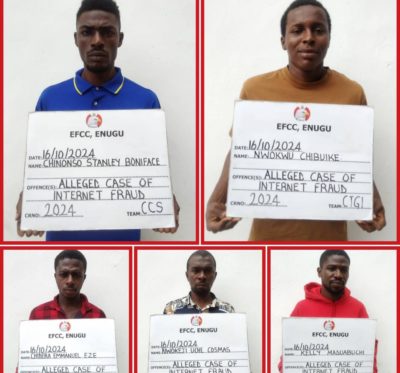In a significant win against cybercrime, the Economic and Financial Crimes Commission (EFCC) has successfully prosecuted and secured the conviction of 34 internet fraudsters in Awka, Anambra State. Justice Evelyn Anyadike of the Federal High Court presided over the case, issuing sentences that ranged from imprisonment to community service, marking a crucial step in the government’s effort to combat online fraud.
The convicts, apprehended during coordinated raids in Onitsha, were charged with various offenses, including fraudulent impersonation, possession of proceeds of crime, and obtaining money by false pretense. According to the court, each convict was involved in deceptive schemes targeting foreign nationals and other vulnerable individuals online.
Detailed Charges and Conviction Terms
Each convict faced a one-count charge based on their unique fraudulent actions, often involving impersonation or fake representations for financial gain. For instance, one of the defendants, Ifeanyi Aju Kingsley, was accused of posing as a foreign national named Erica Clark to scam unsuspecting individuals on a fake Facebook profile. Kingsley used an HP Elite Book computer in his scheme, attempting to manipulate foreign nationals for personal benefit.
Another convict, Kalu Odeghe Olu, was charged with presenting himself as a foreign shipping agent through a fake email address, orbitglobalexpresstopofficial@gmail.com. This impersonation was intended to deceive victims into thinking they were dealing with a legitimate shipping representative, ultimately defrauding them of their money. Both offenses contravened the Cybercrime (Prohibition, Prevention, Etc.) Act, 2024, as amended, and are punishable under the act’s provisions.
Sentencing and Pleas for Leniency
Following the reading of the charges, each defendant entered a plea of not guilty. The EFCC’s prosecution counsel, Raymond Edozie, called for stringent punishment for each convict, citing the need to deter further instances of cyber fraud. Defense attorneys, however, argued for leniency, with legal representatives Bernard Okeke, James Nwatarali, and Ifeanyi Odoh highlighting the remorse shown by the convicts.
After careful consideration, Justice Anyadike sentenced each convict to eight months in prison, with an option of a N70,000 fine for most of the offenders. Exceptions were made for two convicts, Nwokwu Chibuike Valerian and Chinonso Stanley Boniface, who were instead assigned to two months of supervised community service. The decision was viewed as a balanced approach, serving both punitive and rehabilitative purposes.
Court Orders Seizure and Auction of Recovered Devices
To further prevent future fraudulent activities, Justice Anyadike ordered the seizure and auctioning of the convicts’ devices, including mobile phones and laptops. Proceeds from these sales will be deposited into the Single Treasury Account of the Federation. The seized devices, which served as tools in the commission of the crimes, are seen as key evidence of the suspects’ engagement in internet fraud.
This case highlights the EFCC’s intensified focus on combating cybercrime, with the seized assets from the convicts serving as a deterrent to others engaging in similar activities. The funds from the auction will also contribute to public revenue, reinforcing the government’s stance on enforcing the rule of law in cyber-related offenses.
EFCC Ongoing Efforts to Combat Cybercrime in Nigeria
The EFCC’s conviction of these 34 fraudsters reflects the ongoing efforts to curb the rising tide of internet fraud in Nigeria. On October 11, 2024, the EFCC launched multiple raids in Onitsha, targeting cybercriminals who were found to be operating sophisticated schemes. Investigations revealed that some of the convicted individuals were impersonating foreign shipping agents, while others had crafted fake profiles to scam individuals, particularly vulnerable women overseas.
These convictions send a strong message regarding the government’s commitment to safeguarding digital security. By prosecuting these individuals, the EFCC aims to instill a sense of accountability and protect victims from financial exploitation. The ruling in Awka serves as a reminder of the consequences awaiting those who engage in internet-related crimes, reinforcing the EFCC’s dedication to combating online fraud in Nigeria.
Table of Contents
Discover more from OGM News NG
Subscribe to get the latest posts sent to your email.














